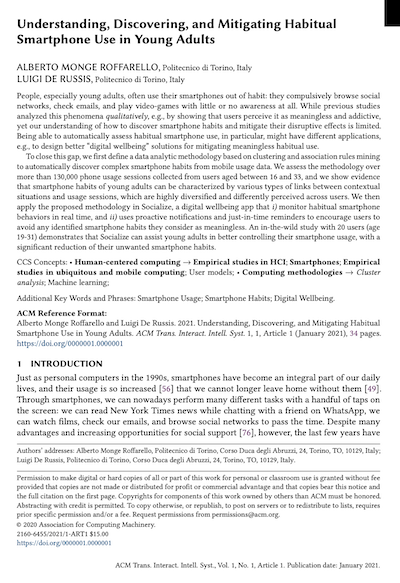People, especially young adults, often use their smartphones out of habit: they compulsively browse social networks, check emails, and play video-games with little or no awareness at all. While the literature analyzed this phenomena qualitatively, e.g., by showing that users perceive it as meaningless and addictive, yet our understanding of how to discover smartphone habits and mitigate their disruptive effects is limited. Being able to automatically assess habitual smartphone use, in particular, might have different applications, e.g., to design better digital wellbeing solutions for mitigating meaningless habitual use.
The paper "Understanding, Discovering, and Mitigating Habitual Smartphone Use in Young Adults", recently accepted by the ACM Transactions on Interactive Intelligent Systems, tries to close this gap.
The paper first defines a data analytic methodology based on clustering and association rules mining to automatically discover complex smartphone habits from mobile usage data. The methodology was then assessed over more than 130,000 phone usage sessions collected from users aged between 16 and 33, and we show evidence that smartphone habits of young adults can be characterized by various types of links between contextual situations and usage sessions, which are highly diversified and differently perceived across users.
The proposed methodology was applied in Socialize, a digital wellbeing app that i) monitor habitual smartphone behaviors in real time, and ii) uses proactive notifications and just-in-time reminders to encourage users to avoid any identified smartphone habits they consider as meaningless. An in-the-wild study demonstrates that Socialize can assist young adults in better controlling their smartphone usage, with a significant reduction of their unwanted smartphone habits.
More information:
- Paper on PORTO@IRIS, our institutional repository


